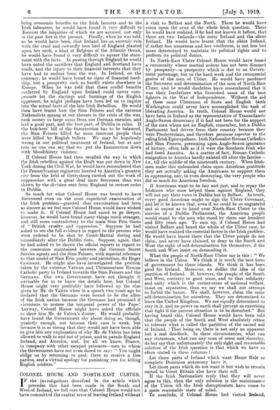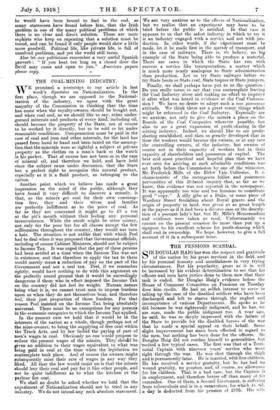COLONEL HOUSE AND NORTH-EAST ULSTER.
1F the investigations described in the. article which precedes this had been made in the South and West of Ireland, we feel sure that Colonel House would not have committed the capital error of leaving Ireland without a visit to Belfast and the North. There he would have come upon the crux of the whole Irish question. There he would have realized, if he had not known it before, that there are two Irelands—the noisy Ireland and the silent Ireland. He would have learnt that the silent Ireland, if rather less numerous and lass vociferous, is not less but more determined to maintain its political rights and to perform its political duties.
In North-East Ulster Colonel House would have found a community whose martial ardour has not been dimmed by prosperity—a proaperity which is due to no Government patronage, but to the hard work and the commercial genius of the men of Ulster. He would have pardoned the fierceness and determination of the men of North-East Ulster, and, he would doubtless have remembered that it was their forefathers who furnished some of the best fighters in the War of Independence. Without the aid of these same Ulstermen of Scots and English birth Washington could never have accomplished the task of liberating America. In truth, Colonel House would not have been in Ireland as the representative of Transatlantic Anglo-Saxon democracy if it had not been for the support of the men whom not an English, remember, but a Dublin Parliament had driven from their country because they were Presbyterians, and therefore personae ingratae to the ruling Irish Episcopalians. Irish Nationalist Roman Catholics and Sinn Feiners, presuming upon Anglo-Saxon ignorance of history, often talk as if it were the Southern Irish who had freed America. As a matter of fact, Roman Catholic emigration to America hardly existed till after the faminei.e., till the middle of the nineteenth century. When Irishmen make this unfounded claim upon American gratitude they are actually asking the Americans to support them in oppressing, nay, in even destroying, the very people who did so much for American freedom.
If Americans want to be fair and just, and to repay the Irishmen who once helped them against England, they will not pay their vows in Dublin but in Belfast. In truth, every good American ought to sign the Ulster Covenant, and let it be known that, even if we could be so ungrateful and so unjust as to hand over North-East Ulster to the mercies of a Dublin Parliament, the American people would stand by the men who stood by them one hundred and fifty years ago. To sum up, if Colonel House had visited Belfast and heard the whole of the Ulster case, he would have realized the essential factor in the Irish problem. He would have learnt there that the Ulster people do not claim, and never have claimed, to deny to the g' outh and West the right of self-determination for themselves, if the South and West insist on demanding it.
What the people of North-East Ulster say is this : "We believe in the Union. We think it is much the best form of government for these islands. We think it has been good for Ireland. Moreover, we dislike the idea of the partition of Ireland. If, however, the people of the South and West, contrary to good sense, and to that solidarity and unity which is the corner-stone of national welfare, insist on separation, then we say we shall not attempt to forbid the banns. We shall, however, claim the same self-determination for ourselves. They are determined to leave the United Kingdom. We are equally determined tostay in it, and no power on earth shall prevent us exercising that right if the present situation is to be disturbed." But having heard this, Colonel House would have been told that the people of the South and West absolutely refuse to tolerate what is called the partition of the sacred soil of Ireland. That being so, there is not only an apparent but a real deadlock. In these circumstances, what can any statesman, what can any man of sense and sincerity, do but say that unfortunately the only right and reasonable solution of the Irish question is that which we have so often stated in these columns ?
Let those parts of Ireland which want Home Rule or complete Dominion autonomy have it.
Let those parts which do not want it but wish to remain united to Great Britain also have their will.
If the Irish Nationalists reply that they will never agree to this, then the only solution is the maintenance of the Union till the Irish disruptionists have come to a more reasonable state of mind.
To conclude, if Colonel House had visited Ireland; he would have been bound to find in the end, as many statesmen have found before him, that the Irish problem is one of the many political problems of which there is no clear and direct solution. Those are mere sophists who keep on repeating that a solution must be found, and can be found if only people would show a little more goodwill. Political life, like private life, is full of unsolved problems, and yet the world still turns.
Also let our politicians remember a very useful Spanish proverb "If you beat too long on a closed door the Devil may come and open to you." American papers please copy.















































 Previous page
Previous page